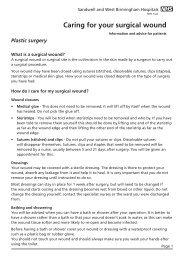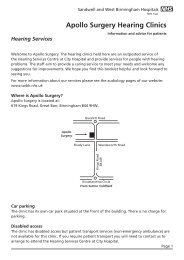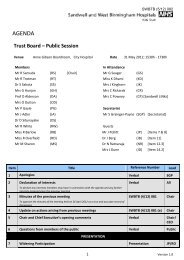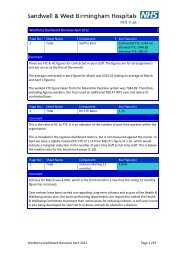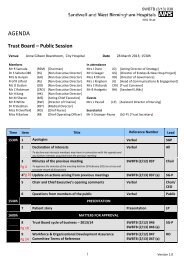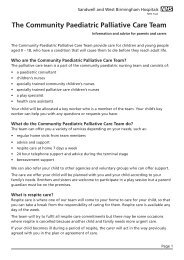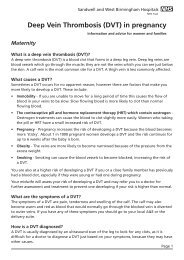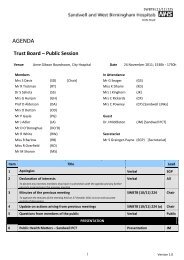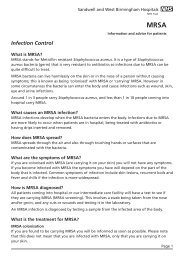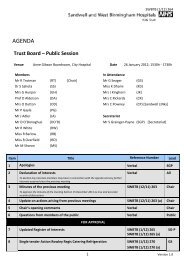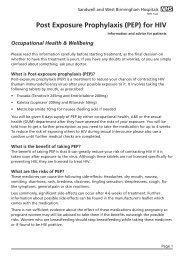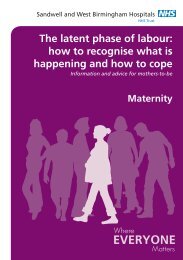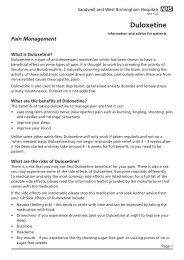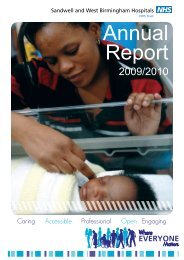Henoch-Schönlein Purpura (HSP) - Sandwell & West Birmingham ...
Henoch-Schönlein Purpura (HSP) - Sandwell & West Birmingham ...
Henoch-Schönlein Purpura (HSP) - Sandwell & West Birmingham ...
Create successful ePaper yourself
Turn your PDF publications into a flip-book with our unique Google optimized e-Paper software.
<strong>Henoch</strong>-Schönlein <strong>Purpura</strong> (<strong>HSP</strong>)<br />
Paediatrics<br />
Information and advice for parents and carers<br />
What is <strong>Henoch</strong>-Schönlein <strong>Purpura</strong> (<strong>HSP</strong>)?<br />
<strong>Henoch</strong>-Schönlein <strong>Purpura</strong> (<strong>HSP</strong>) is an illness where the small blood vessels in the body<br />
become inflamed and fragile. <strong>HSP</strong> is not infectious so it cannot be passed on from one person<br />
to another.<br />
About 2 in 10,000 children in the UK get <strong>HSP</strong> each year.<br />
What are the symptoms of <strong>HSP</strong>?<br />
The symptoms of <strong>HSP</strong> are:<br />
• A red or purple spotty rash. This is usually on the feet, lower legs and bottom but can<br />
occur anywhere on the body and does not disappear when a glass is pressed on it.<br />
Everyone with <strong>HSP</strong> has a rash.<br />
• Painful swollen joints, especially the knees and ankles.<br />
• Abdominal (tummy) pain.<br />
Some also experience:<br />
• Feeling or being sick.<br />
• Diarrhoea which may have blood in it.<br />
• Blood in their urine.<br />
• A temperature of 37.5°C or above.<br />
• Headaches.<br />
<strong>HSP</strong> can also cause kidney problems, bleeding in the gut (intestines) and, in boys, a swollen<br />
and painful scrotum.<br />
What causes <strong>HSP</strong>?<br />
<strong>HSP</strong> is caused by the body’s immune system reacting to something, but we don’t know<br />
exactly what to. The reaction may be triggered by:<br />
• an infection or cold,<br />
• a vaccination or medicine, or<br />
• an insect bite.<br />
How is <strong>HSP</strong> diagnosed?<br />
<strong>HSP</strong> is diagnosed by examining your child and doing a blood test and urine test.<br />
Page 1
<strong>Henoch</strong>-Schönlein <strong>Purpura</strong> (<strong>HSP</strong>)<br />
Paediatrics<br />
Information and advice for parents and carers<br />
How is <strong>HSP</strong> treated?<br />
<strong>HSP</strong> will usually get better on its own within 4 weeks without any treatment, but your child<br />
will be given painkillers if they have joint and tummy pains and will need to rest.<br />
Some children can develop kidney problems or bleeding in their gut so your child may need<br />
to be looked after in hospital so we can monitor them for these. If your child does develop<br />
kidney problems or bleeding in their gut these will need treatment. The treatment will<br />
depend on how severe they are and your child’s doctor will discuss this with you beforehand.<br />
Your child’s rash will gradually fade and disappear without treatment, but may come back<br />
for a few months without the other symptoms of <strong>HSP</strong>.<br />
Your child is not infectious while they have <strong>HSP</strong> so they do not need to stay away from other<br />
people. However they should get plenty of rest until they are feeling better.<br />
Follow-up<br />
If the <strong>HSP</strong> was mild, your child will need to have a follow-up appointment at the hospital<br />
after about 3 months to check that all the symptoms have resolved.<br />
You will also need to check your child’s urine regularly for blood and protein during this<br />
period because there is still a risk that their kidneys could become affected. To do this you<br />
will need to get your child to pass urine into a clean container, and then dip a testing strip<br />
into it. The testing strip will detect if there is blood or protein in your child’s urine. The<br />
nurses will teach you how read the testing strip and tell you what to do with the result<br />
before you leave the hospital.<br />
If the <strong>HSP</strong> affected your child’s kidneys he/she may need to see the doctor more often and for<br />
longer than 3 months.<br />
Symptoms to report<br />
If your child experiences any of the following symptoms after he/she has been diagnosed<br />
with <strong>HSP</strong> please contact their GP or the ward they were treated on:<br />
• their joints become more painful<br />
• they have severe tummy ache<br />
• their urine becomes red-coloured<br />
• their urine test shows they have more protein in their urine than before<br />
• they have diarrhoea with blood in it.<br />
Page 2
<strong>Henoch</strong>-Schönlein <strong>Purpura</strong> (<strong>HSP</strong>)<br />
Paediatrics<br />
Information and advice for parents and carers<br />
Contact details<br />
If your child has been treated in hospital and, within 24 hours of them being discharged, you<br />
have any questions or concerns please contact the ward they were treated on:<br />
Lyndon Ground<br />
0121 507 3717<br />
Lyndon 1<br />
0121 507 3800<br />
Paediatric Assessment Unit<br />
(City Hospital)<br />
0121 507 4019<br />
After this time, or if your child has not required hospital treatment, please contact your GP<br />
or NHS Direct.<br />
NHS Direct<br />
0845 46 47<br />
Further information<br />
For more information about our hospitals and services please see our websites<br />
www.swbh.nhs.uk and www.swbhengage.com, follow us on Twitter @SWBHnhs and like us<br />
on Facebook www.facebook.com/SWBHnhs.<br />
Sources used for the information in this leaflet<br />
• Patient UK Professional Reference, ‘<strong>Henoch</strong> Schonlein <strong>Purpura</strong>’, October 2009<br />
If you would like to suggest any amendments or improvements to this leaflet please contact the<br />
communications department on 0121 507 5420 or email: swb-tr.swbh-gm-patient-information@nhs.net<br />
A Teaching Trust of The University of <strong>Birmingham</strong><br />
Incorporating City, <strong>Sandwell</strong> and Rowley Regis Hospitals<br />
© <strong>Sandwell</strong> and <strong>West</strong> <strong>Birmingham</strong> Hospitals NHS Trust<br />
ML4206<br />
Issue Date: May 2013<br />
Review Date: May 2015<br />
Page 3



